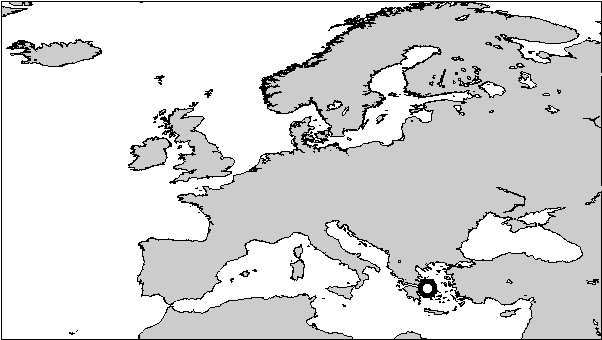
| www.CuriousTaxonomy.net |
|
The Flood in World Myth and Folklore
Europe |
| © 2021 Mark Isaak |

Zeus sent a flood to destroy the men of the Bronze Age. Prometheus advised his son Deucalion to build a chest. All other men perished except for a few who escaped to high mountains. The mountains in Thessaly were parted, and all the world beyond the Isthmus and Peloponnese was overwhelmed. Deucalion and his wife Pyrrha (daughter of Epimetheus and Pandora), after floating in the chest for nine days and nights, landed on Parnassus. When the rains ceased, he sacrificed to Zeus, the God of Escape. At the bidding of Zeus, he threw stones over his head; they became men, and the stones which Pyrrha threw became women. That is why people are called laoi, from laas, "a stone."
Apollodorus, ed. Sir James G. Frazer (transl.), The Library (Cambridge, Harvard University Press, 1921, 1976), 1.7.2.

A version of the Deucalion myth is also related by Lucian in his description of held in Hierapolis on the Euphrates, where Greek culture was spread by Alexander's conquests.
The first race of people was completely destroyed because they were exceedingly wicked. The fountains of the deep opened, the rain fell in torrents, and the rivers and seas rose to cover the earth, killing all of them. Deucalion survived due to his prudence and piety and linked the first and second race of men. Onto a great ark he loaded his wives and children and all animals. The animals came to him, and by God's help, remained friendly for the duration of the flood. The flood waters escaped down a chasm opened in Hierapolis.
Frazer, 1919, 153-154.

An older version of the story told by Hellanicus, a Greek historian of the 5th century B.C.E., has Deucalion's ark landing on Mount Othrys in Thessaly. Another account has him landing on a peak, probably Phouka, in Argolis, later called Nemea.
Frazer, 1919, 147, 148.

The Megarians told that Megarus, son of Zeus, escaped Deucalion's flood by swimming to the top of Mount Gerania, guided by the cries of cranes.
Frazer, 1919, 148.

An earlier flood was reported to have occurred in the time of Ogyges, founder and king of Thebes. The flood covered the whole world and was so devastating that the country remained without kings until the reign of Cecrops.
Frazer, 1919, 157-158.

The story of Atlantis arguably does not qualify as folklore, since its original author and story are known. However, it has a rich folkloric tradition in the centuries since Plato wrote it.
"Many great deluges have taken place during the nine thousand years" since Athens and Atlantis were preeminent. Destruction by fire and other catastrophes was also common. In these floods, water rose from below, destroying city dwellers but not mountain people. The floods, especially the third great flood before Deucalion, washed away most of Athens' fertile soil.
Plato, Timaeus and Critias, trans. Desmond Lee (New York: Penguin, 1986), 35, 38, 133-134 (Timaeus 22, 25; Critias 111-112).

Dardanus, first king of Arcadia, was driven from his land by a great flood which submerged the lowlands, rendering them unfit for cultivation. The people retreated to the mountains, but they soon decided that the land left was not enough to support them all. Some stayed with Dimas, son of Dardanus, as their king; Dardanus led the rest to the island of Samothrace.
Frazer, 1919, 163.

The sea rose when the barriers dividing the Black Sea from the Mediterranean burst, releasing waters from the Black Sea in a great torrent that washed over part of the coast of Asia and the lowlands of Samothrace. The survivors on Samothrace retreated to the mountains and prayed for deliverance. On being saved, they set up monuments to the event and built alters on which to continue sacrifices through the ages. Fishermen still occasionally draw up parts of stone columns in their nets, signs of cities drowned in the sea.
Frazer, 1919, 167-168.
